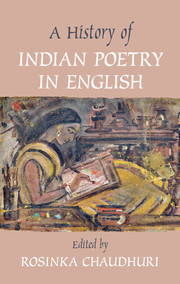Book contents
- Frontmatter
- Contents
- Contributors
- Acknowledgments
- Introduction
- SECTION I THE BROAD NINETEENTH CENTURY: INDIANS IN ENGLISH AND THE ENGLISH IN INDIA
- 1 The First Indian Poet in English: Henry Louis Vivian Derozio
- 2 English Poetry in India: The Early Years
- 3 From Albion's Exile to India's Prodigal Son: The English Poetry of Michael Madhusudan Datta (1824–1873)
- 4 Transforming Late Romanticism, Transforming Home: Women Poets in Colonial India
- 5 The Locations and Dislocations of Toru and Aru Dutt
- 6 Poetry of the Everyday: Comic Verse in the Nineteenth Century
- 7 Toru Dutt and “An Eurasian Poet”
- 8 Rabindranath Translated to Tagore: Gitanjali Song Offerings (1912)
- SECTION II PUBLISHERS, PUBLISHING HOUSES, AND THE PERIODICAL PRESS
- SECTION III POETRY: 1950–2000
- SECTION IV POETS OF THE DIASPORA
- SECTION V THE NEW MILLENNIUM POETS ON THEMSELVES
- Bibliography
- Index
2 - English Poetry in India: The Early Years
from SECTION I - THE BROAD NINETEENTH CENTURY: INDIANS IN ENGLISH AND THE ENGLISH IN INDIA
Published online by Cambridge University Press: 05 March 2016
- Frontmatter
- Contents
- Contributors
- Acknowledgments
- Introduction
- SECTION I THE BROAD NINETEENTH CENTURY: INDIANS IN ENGLISH AND THE ENGLISH IN INDIA
- 1 The First Indian Poet in English: Henry Louis Vivian Derozio
- 2 English Poetry in India: The Early Years
- 3 From Albion's Exile to India's Prodigal Son: The English Poetry of Michael Madhusudan Datta (1824–1873)
- 4 Transforming Late Romanticism, Transforming Home: Women Poets in Colonial India
- 5 The Locations and Dislocations of Toru and Aru Dutt
- 6 Poetry of the Everyday: Comic Verse in the Nineteenth Century
- 7 Toru Dutt and “An Eurasian Poet”
- 8 Rabindranath Translated to Tagore: Gitanjali Song Offerings (1912)
- SECTION II PUBLISHERS, PUBLISHING HOUSES, AND THE PERIODICAL PRESS
- SECTION III POETRY: 1950–2000
- SECTION IV POETS OF THE DIASPORA
- SECTION V THE NEW MILLENNIUM POETS ON THEMSELVES
- Bibliography
- Index
Summary
What happens if we take for our model of the late eighteenth-century British poet in India not one of the many men who moved there in the service of the East India Company, but a woman about whom we know little – Anna Maria? Mary Ellis Gibson, editor of Anglophone Poetry in Colonial India, 1780–1913, reminds us that all we have of this poet is a slim volume, The Poems of Anna Maria, and that we “can attach no definite name, no parentage, no dates of birth and death” to her. In fact, “Anna Maria” might well be a nom de plume chosen by a poet who wished to claim affiliation to the circle of Della Cruscan poets in London and Florence, in the same way that Hannah Cowley became “Anna Matilda” and Mary Robinson styled herself “Laura Maria.” For Robert Merry (“Della Crusca” himself), Italian poetics authorized the mannered, overwrought lyricism that he and his friends articulated in poetic dialogues in London in the 1780s, and Gibson suggests that Anna Maria, writing in Calcutta, fondly imagined her poetry joining in that international conversation.
What internationalism did Anna Maria bring to these poetic dialogues? Precious little, other than references that linked Greek and Latin classicism and eighteenth-century English art and aesthetics. Even though some of her poems were published in the Calcutta weekly Asiatic Mirror and the Calcutta Morning Post, they are formulaic exercises in contemporary English poetics. Her “Ode to Happiness” complains of not finding this “Phantom” in the life of English luxury, or indeed country retirement, and of seeking it equally unsuccessfully across the globe from Greenland's “bleak unfriendly Coast” to the tropics. This poem rehearses the piety and sentimentality produced in poem after poem by poets who never left English shores. The point here is not that Anna Maria was an unimaginative poet, but that her poetry does not suggest any elements of her experience of India. This is as true of her “Ode to Sensibility” as it is of her “Ode to Reflection,” “Ode to Solitude,” or “Ode to Fancy.”
- Type
- Chapter
- Information
- A History of Indian Poetry in English , pp. 32 - 47Publisher: Cambridge University PressPrint publication year: 2016
- 3
- Cited by



